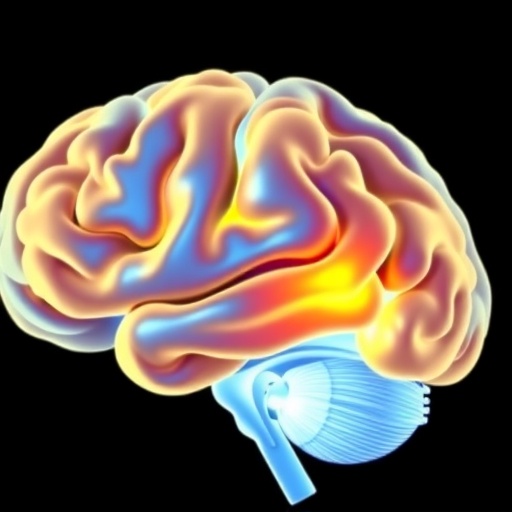In a groundbreaking study published in BMC Pediatrics, researchers Su, Mao, and Chen, among others, explore critical dimensions of how maternal exposure to exogenous progesterone during pregnancy influences the neurodevelopment of offspring. This research is particularly important as it examines the delicate interplay between hormonal treatments during gestation and the cognitive and emotional outcomes for children. As we delve into the nuances of this exploration, it is paramount to underscore the sheer significance of its implications for maternal health and child development.
The hormone progesterone is well-known for its essential roles in various physiological processes. Traditionally viewed as a key player in maintaining pregnancy, its therapeutic applications have widened over the years. In obstetric settings, exogenous progesterone has been used for various purposes, including preventing preterm births and managing certain reproductive challenges. However, this expanded use raises vital questions about potential long-term effects on children’s development, particularly concerning neural pathways and cognitive functions.
In the present study, the authors meticulously evaluated the outcomes related to neurodevelopment in offspring exposed to maternal progesterone during different stages of pregnancy. By utilizing an extensive sample size and employing rigorous methodologies, they sought to ascertain whether this hormonal intervention could lead to observable differences in neurodevelopmental milestones among children. The implications of their findings are far-reaching, particularly as they pertain to clinical practices surrounding pregnancy management.
Central to the study’s inquiries is the assertion that maternal health directly correlates with child development. The research emphasizes that hormonal exposure, particularly during critical developmental windows, is crucial. This assertion aligns with a growing body of evidence suggesting that prenatal environments significantly shape neurological outcomes. The findings from Su et al. not only add to this discourse but challenge existing paradigms regarding hormonal treatment protocols.
One of the study’s key findings posits that children exposed to exogenous progesterone during gestation exhibited variations in cognitive behaviors and emotional responses compared to those who were not. This raises important questions about the mechanisms underlying such developmental discrepancies. The authors detail potential biological pathways through which altered hormone levels during critical periods could influence brain development, including synaptic plasticity and neural connectivity. These insights lend credence to theories positing that prenatal hormonal environments lay the groundwork for postnatal neurodevelopmental trajectories.
Moreover, the timing and dosage of progesterone administration appeared to influence outcomes significantly. The researchers discovered that exposure during specific windows of fetal development correlated with either beneficial or detrimental effects, highlighting the nuanced relationship between hormone administration and fetal growth. Such findings underscore the importance of personalized medicine in obstetrics, where treatment approaches may need to be tailored to individual circumstances rather than adopting a one-size-fits-all model.
This research also meticulously addresses the potential long-term developmental impacts stemming from elevated maternal progesterone levels. The follow-up assessments conducted on children exposed to exogenous progesterone revealed that certain cognitive skills, including memory and problem-solving abilities, were noticeably affected. This finding has critical ramifications, particularly for educational frameworks that aim to support children’s learning trajectories. It underscores an imperative for educators and practitioners to be cognizant of these early influences when designing interventions.
In probing deeper into the implications of their findings, the authors reflect on the ethical dimensions of administering hormonal treatments during pregnancy. The study calls for further research to attend to the ethical complexities involved in the use of hormone therapies, particularly when the potential side effects may not be fully understood. Assertions around informed consent come into play, wherein parents must be adequately informed about the possible implications of such treatments on their children’s health and development.
Furthermore, the authors note societal implications since this research might have ripple effects on public health policies. Policymakers are encouraged to prioritize maternal wellness programs and ensure they reflect the latest scientific findings regarding prenatal care. Understanding the balance between medical interventions and their potential long-term impacts is essential for shaping future healthcare practices that prioritize both maternal and child health.
Additionally, the international scope of the study emphasizes its relevance across diverse populations. By including participants from varied backgrounds, the research incorporates an array of genetic and environmental factors. This enhances the generalizability of the findings, suggesting that similar patterns may emerge in different cultural contexts and healthcare systems.
Moreover, the study calls for increased interdisciplinary collaboration between obstetricians, pediatricians, and neuroscientists. The complexities surrounding neural development necessitate a multifaceted approach, where collective expertise can help shape protocols that are both safe and effective. The findings encourage ongoing dialogues within the medical community about our understanding of hormonal influences during pregnancy and how such knowledge can shape better clinical outcomes.
In conclusion, the revelations put forth by Su et al. present us with newfound insights into the relationships between maternal hormone treatments and child neurodevelopment. As scientific inquiry continues to evolve, it is evident that understanding the baseline interactions between maternal health and childhood developmental trajectories is crucial. This study challenges us to rethink traditional perspectives on pregnancy care as we strive for an integrated approach that encompasses psychological, biological, and social well-being.
The framing of maternal health interventions may be on the verge of transformation as a result of this research. With further scrutiny and exploration necessary, the ongoing discussions surrounding these developments will likely engage a multitude of stakeholders invested in the health of future generations. Ultimately, the goal is to foster environments that ensure the best possible start in life for all children, aligned with the findings from this transformative research.
Subject of Research: Effects of maternal exposure to exogenous progesterone during pregnancy on offspring neurodevelopment
Article Title: Effects of maternal exposure to exogenous progesterone during pregnancy on offspring neurodevelopment
Article References:
Su, Y., Mao, H., Chen, X. et al. Effects of maternal exposure to exogenous progesterone during pregnancy on offspring neurodevelopment.
BMC Pediatr 25, 772 (2025). https://doi.org/10.1186/s12887-025-05913-0
Image Credits: AI Generated
DOI: 10.1186/s12887-025-05913-0
Keywords:Maternal health, progesterone, neurodevelopment, child outcomes, hormonal therapy, pregnancy, cognitive function, ethical considerations, public health policy.




